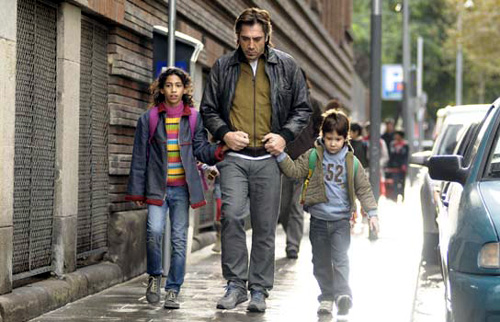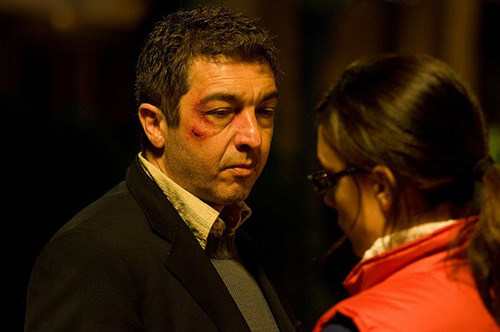|
Having done wrong, how do you atone for it? Three recent films offer different visions of wrongdoing, at varying levels of magnitude, and reach different conclusions about the possibility of atonement.
It's far from surprising that one of the directors represented here is Alejandro Gonzalez Inarritu, who has made himself the cinema's poet of inconsolable grief. In his previous films—Amores Perros, 21 Grams, Babel—Gonzalez Inarritu presented interlocking stories of characters destroying themselves and each other through a combination of blind fate and their own character failings. His latest film, Biutiful, concentrates on one character—the dying, remorseful underworld figure Uxbal (Javier Bardem)—but it is Gonzalez Inarritu's most operatic representation of the human tragedy to date.
Uxbal is what the English would call a dodgy character. He makes his living in the Barcelona slums as a middleman between two sets of criminals; one set brings African and Chinese immigrants illegally to Spain, and the other employs the immigrants to make and sell counterfeit purses and wallets. Uxbal's worthless brother Tito (Eduard Fernandez) is having an affair with Uxbal's estranged wife Marambra (Maricel Alvarez), a bipolar, recovering junkie who is worse than useless in helping to raise her and Uxbal's two small children. When Uxbal discovers he has terminal prostate cancer, he becomes desperate both to ensure his children's future and to make life better for the immigrants he has helped to cheat. These goals, however, prove nearly impossible to achieve—a fact brought home by a tragedy in the film's midsection, when a well-intentioned but ill-thought-out gesture of kindness on Uxbal's part goes hideously awry
 |
Shot in grungy close-up in sections of Barcelona no tourist would recognize, Biutiful is 150 minutes of nearly unrelieved misery, superbly made but difficult to sit through. Binding the film together, and making it altogether worthwhile, is the acting—particularly that of Bardem, who once again proves himself one of the greatest actors working in any language. Bardem has an almost preternatural ability to portray remorse, and his Uxbal is a man truly sick in his soul, drowning in grief and longing for redemption.
That said, there is one aspect of Uxbal's character that Gonzalez Inarritu fails to integrate successfully into the movie. Like Haley Joel Osment in The Sixth Sense, Uxbal sees dead people. Specifically, he speaks to the recent dead and earns money from the bereaved by doing so. I'm not really sure of Gonzalez Inarritu's purpose in giving Uxbal this talent. Does it signify the corruption of his soul by using a spiritual gift as a way to earn money? Or is it intended merely to offer some hope amid the general mood of despair?
My favorite parts of Biutiful are the rhyming sequences at the beginning and end. The first scene shows Uxbal telling his small daughter about the diamond ring he wears; the second shows Uxbal in a wintry landscape, meeting a young man. These scenes have a mysterious grace that alleviate the film's pervasive gloom, beginning and ending the film on a note of poignant hope.
What hope exists in Biutiful is dashed utterly in Carancho, the new crime drama by the Argentinian director Pablo Trapero. "Carancho" is Argentine slang meaning "ambulance chaser," and the film's prologue tells us that traffic accidents have become epidemic in Argentina, leaving that country's impoverished, largely uninsured populace vulnerable to a pack of professional shysters. Protected by corrupt police, these "caranchos" negotiate damage settlements with insurance companies on behalf of injured or bereaved clients, then pocket most of the money. Often, with the semi-willing participation of cash-strapped drunks or junkies, they stage the accidents themselves.
Sosa (Ricardo Darin) is a disbarred lawyer who insists he's only in the carancho game until he can get his license back; savage beatings from thugs who think he's taken more than his fair share are part of his daily life. Lujan (Martina Gusman, Carancho's executive producer) is an idealistic young emergency room doctor/paramedic who finds the constant pressure too much for her, and who seeks solace in drugs.
Sosa and Lujan meet at a random accident scene; Sosa is instantly smitten, and after some initial wariness she falls for him too. However, things go abruptly wrong between them when Lujan encounters Sosa at another accident scene where he cannot explain his presence; she realizes this is a staged accident gone awry, and tells Sosa to stay away from her.
Now Sosa realizes he must take radical steps to win Lujan back, gain some sort of justice for his remaining clients, and leave the carancho game forever. However, in a world where violent retribution and blind fate have the upper hand, Sosa's goals are a chancy wager at best.
Carancho is a dark, nonstop thrill ride; the friend with whom I saw the film described it as Gray's Anatomy remade by Quentin Tarantino. Its nightmare vision of Buenos Aires, enhanced by claustrophobic close-ups from hand-held cameras, outdoes even Gonzalez Inarritu in creating a pervasive sense of doom, and the surprise ending, which could feel cheap and O. Henryish in lesser hands, feels thoroughly earned here.
 |
As with Biutiful, Carancho benefits from the presence of a masterful, charismatic lead actor. Ricardo Darin—who also starred in Nine Queens and the Oscar-winning The Secret in Their Eyes—is not only in the same league as an actor as Javier Bardem, but in many ways is directly comparable to him. Darin has the same sort of blunt, broken but attractive face as Bardem—indeed, even more blunt and broken—and the same ability to portray the soul-sickness of a man who has seen and done too much. His Sosa is a character out of grand opera, sympathetic and richly human, but too hotheaded and violent for his story to have anything resembling a happy ending.
On a vastly happier note, Thomas McCarthy's Win Win portrays a moment of weakness in the life of a kind, decent guy, and how unforeseen circumstances force him to face up to what he's done.
Mike Flaherty (Paul Giamatti) is a small-town New Jersey lawyer and high-school wrestling coach with a loving wife (Amy Ryan), two adorable small daughters, and a rapidly failing practice. Desperate for extra cash, he finagles his way into becoming the court-appointed guardian of Leo Poplar (Burt Young), an old man in the beginning stages of Alzheimer's, and pockets the $1,500-per-month guardian fee. At the same time, he reneges on his promise to the court to allow Leo to live at home and look after him there, putting him in an assisted-living facility instead.
Nobody knows about Mike's little lie—neither the court, nor his wife Jackie, nor his law partner and assistant wrestling coach Vig (Jeffrey Tambor), nor his recently divorced best friend Terry (Bobby Cannavale). So everything goes smoothly until the sudden appearance of Kyle Timmons (Alex Shaffer), the grandson Leo didn't even know he had.
Kyle is the son of Cindy (Melanie Lynskey), Leo's long-estranged junkie daughter. A sullen, bleach-blond teenager, Kyle at first promises to be a problem for Mike and Jackie, until the night Mike takes Kyle to watch the wrestling team practice. Kyle turns out to be a wrestling natural, and Mike suddenly has dreams of taking his basement-dwelling team to the state championships. Kyle in turn suddenly has dreams of going to college on a wrestling scholarship, and slowly but surely he bonds with Mike and Jackie. But soon Cindy shows up, sending Kyle into violent rebellion and threatening Mike's entire life.
In his previous films, The Station Agent and The Visitor, Thomas McCarthy showed how strong human bonds can form under the most unexpected circumstances. Win Win continues that theme in a way that feels slightly more conventional than the earlier films, but which also promises to bring McCarthy the larger audience he deserves. If you're expecting Win Win to be a high-school wrestling Rocky, think again. McCarthy never takes us precisely where we expect to go; the real victory in life, he tells us, is not cheating the man in the mirror or anyone who depends on him.
 |
Win Win isn't quite as well-structured as The Station Agent or The Visitor; for example, the characters of Vig and Terry could easily have been combined into one (an observation reinforced by the fact that Vig virtually disappears in the film's last half-hour). But this is a minor quibble against an otherwise funny, touching, satisfying film. The ensemble cast could not be bettered. Paul Giamatti specializes in playing either charming rogues or flawed nice guys; his Mike Flaherty is a prime example of the latter, his face permanently puckered in an expression of worry. Burt Young is charmingly daffy, Bobby Cannavale breezily likable, Jeffrey Tambor a convincing grump. It's interesting to see Amy Ryan and Melanie Lynskey switching personae; here, Ryan is the sort of loving, supportive wife Lynskey played in The Informant!, and Lynskey is the type of fatally weak, self-centered junkie Ryan played in Gone Baby Gone. Both are extremely effective; Lynskey in particular gives an incisive portrait of a woman who destroys everything she touches, simply by being unable to see past her own immediate desires.
Alex Shaffer is a happy surprise as Kyle. An honest-to-goodness state high-school wrestling champ cast for his prowess on the mats, Shaffer gives a natural and touching performance, the kind that makes you hope he will have a real career in the movies. By the same token, I hope to see more movies by Thomas McCarthy, and to see him become the name-above-the-title director he deserves to be.
|

